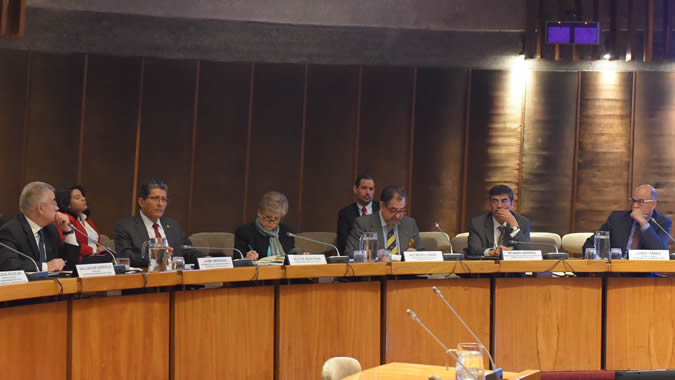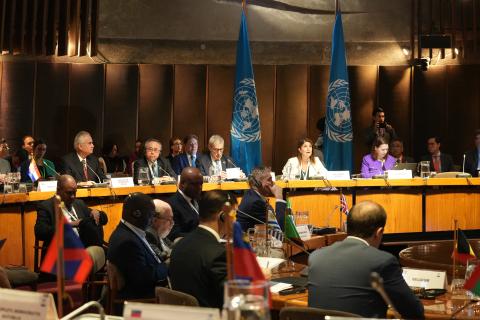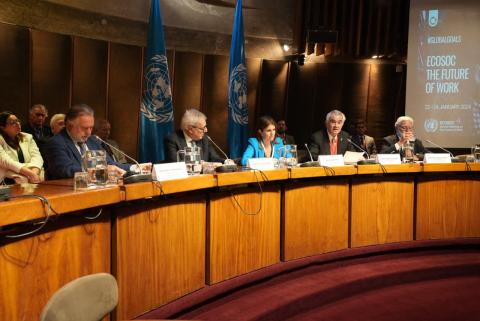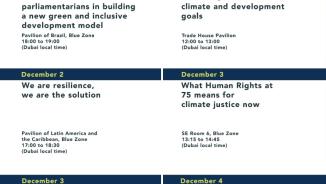Press Release
South-South cooperation is an essential tool and will play a key role in advancing towards the development pattern promoted by the 2030 Agenda, authorities from various countries and international experts said at a seminar held at the headquarters of the Economic Commission for Latin America and the Caribbean (ECLAC) in Santiago, Chile.
The international seminar Ibero-America Faced With the Challenge of the Sustainable Development Goals: The South-South Cooperation Perspective—organized by the Ibero-American Program for the Strengthening of South-South Cooperation, the Chilean International Cooperation Agency (AGCI) and ECLAC—was inaugurated on Wednesday, April 13 by Alicia Bárcena, Executive Secretary of the United Nations regional organization; Jaime Miranda, El Salvador’s Deputy Minister for Development Cooperation; Salvador Arriola, Secretary for Ibero-American Cooperation of the Ibero-American Secretariat General (SEGIB); and Alfredo Labbé, Chile’s Undersecretary of Foreign Affairs.
At this event, which will be held through Thursday, April 14, participants are analyzing the prospects and challenges of Ibero-American countries and the role of international cooperation—and especially South-South cooperation—in the implementation of the Sustainable Development Goals (SDGs). This is an initiative that reinforces the complementarity of the work on these matters by ECLAC, the Ibero-American Program for the Strengthening of South-South Cooperation, the government of Chile (through AGCI) and SEGIB.
In her welcome remarks, Alicia Bárcena highlighted the importance of horizontal and triangular cooperation (made with donor countries) to achieve the new model that the 2030 Agenda demands for sustainable development and its goals, which were approved last year by the United Nations’ member countries.
“The current pattern of development has become unsustainable. We need a change of paradigm and here South-South cooperation plays a central role,” said Alicia Bárcena, who underscored the challenges that arise with respect to the international system’s conception and governance and the debate regarding ways to help.
In that sense, ECLAC’s Executive Secretary insisted that the international cooperation system must seek a comprehensive and broad response to the development problem, with the aim of changing the logic of using per capita income levels to classify countries as middle income—including Latin American and Caribbean nations—and establishing a broader evaluation that takes into account the closing of different structural gaps faced by these countries.
During a later presentation, Bárcena said that these gaps are related to income and inequality; investment, productivity and innovation; infrastructure; education and health; as well as gaps in financial and fiscal matters, gender and the environment.
In her talk, the United Nations senior official stressed the importance of the regional space to achieve complementarity between global and regional institutions, to foster a greater regional and subregional sense of belonging, and to strengthen productive integration, among other actions.
Bárcena emphasized that the meeting under way is enhanced by the presence of delegations from Caribbean countries, and she made special mention of ECLAC’s debt relief proposal for Caribbean nations, particularly Jamaica, through the creation of a Resilience Fund that enables financing of investments aimed at adapting and mitigating the effects of climate change.
Jaime Miranda said that, in the current global context of the 2030 Agenda, cooperation should set new guidelines and confront important challenges. To comply with the SDGs, it will be necessary to strengthen all forms of cooperation, including practices developed in terms of South-South cooperation and triangular cooperation, he said.
“It will be essential to broaden the range of actors and practices in order to create new strategies of South-South cooperation, generating frameworks of more inclusive alliances and renewing joint efforts in regional spaces,” said the Salvadoran Deputy Minister.
Salvador Arriola delivered a message on behalf of Rebeca Grynspan, Secretary General of the Ibero-American Conference (SEGIB), in which he emphasized that South-South cooperation and triangular cooperation are key elements to achieving the ambitious goals of the 2030 Agenda. “We must continue working on the construction of an Ibero-American space that could be a model of cooperation, so that no one lags behind on our path towards a better future,” he said.
Meanwhile, Alfredo Labbé underlined the importance of deepening regional unity in light of the international challenges, with a South-South perspective. “We must seek a regional voice that distinguishes Latin American and Caribbean countries and identifies them. For that, it is essential to build consensus and speak with a unified voice before the international community,” he said.
In the framework of this event, on Thursday, April 14 a meeting of the Presiding Officers of ECLAC’s Committee on South-South Cooperation will be held. The gathering will serve as preparation for a session on the same subject that will take place during the organization’s thirty-sixth session, which will be held in Mexico on May 23-27. That session will address the challenges for South-South cooperation stemming from the implementation of the 2030 Agenda and the agreements of the Addis Ababa conference (of July 2015) on financing for development.



